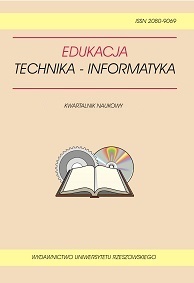Giotto’s Circle – Example of Methodical Procedure for Early Detection/Encouragement of Preschools’ Giftednessfor Solvinglogically-Functional Mathematical Problems
DOI:
https://doi.org/10.15584/eti.2018.2.10Słowa kluczowe:
traditional education system ≠ early (UN) discovery of giftedness, an example of a workflow, didactics, methods, NTC + MensaAbstrakt
The aim of this paper is introduction of didactically-methodical procedure for early detec-tion/encouragement of gifted children in solving problematically-logical and functional problems in math/geometry. We will display this procedure on the example of activities with preschool age group of children (6 years old), on which a new term is acquired – a CIRCLE. Problematical ma-nipulative task called “Draw as correct circle as possible without using a divider”, which was conceptualized by the principles of “Nikola Tesla Center” (NTC) – MENSA of Serbia, was offered in three variants with different level of difficulty and number of didactical material for solving: 1) THE EASIEST PROCEDURE: with a logical block which has circle base + felt pen and paper, 2) MEDIUM-DIFFICULT PROCEDURE: pencil attached to the thread + paper and 3) THE MOST DIFFICULT PROCEDURE: color with brush + paper; Every child should make an indi-vidual attempt to solve all offered procedures – successively, one after the other, and their at-tempts, SUCCESS/FAILURES should be recorded by educator. Besides that, the paper indicates UNWILLINGNESS OF SERBIAN EDUCATION SYSTEM FOR THE GIFTED ONES = the necessary condition of the progress of every society, in which, they are LEFT ON THEIR OWN!.Pobrania
Opublikowane
2018-06-30
Jak cytować
HILČENKO, S. (2018). Giotto’s Circle – Example of Methodical Procedure for Early Detection/Encouragement of Preschools’ Giftednessfor Solvinglogically-Functional Mathematical Problems. Journal of Education, Technology and Computer Science, 24(2), 81–91. https://doi.org/10.15584/eti.2018.2.10
Numer
Dział
PROBLEMY INFORMATYZACJI EDUKACJI WCZESNOSZKOLNEJ
Licencja
Prawa autorskie (c) 2018 Journal of Education, Technology and Computer Science

Utwór dostępny jest na licencji Creative Commons Uznanie autorstwa – Na tych samych warunkach 4.0 Miedzynarodowe.

